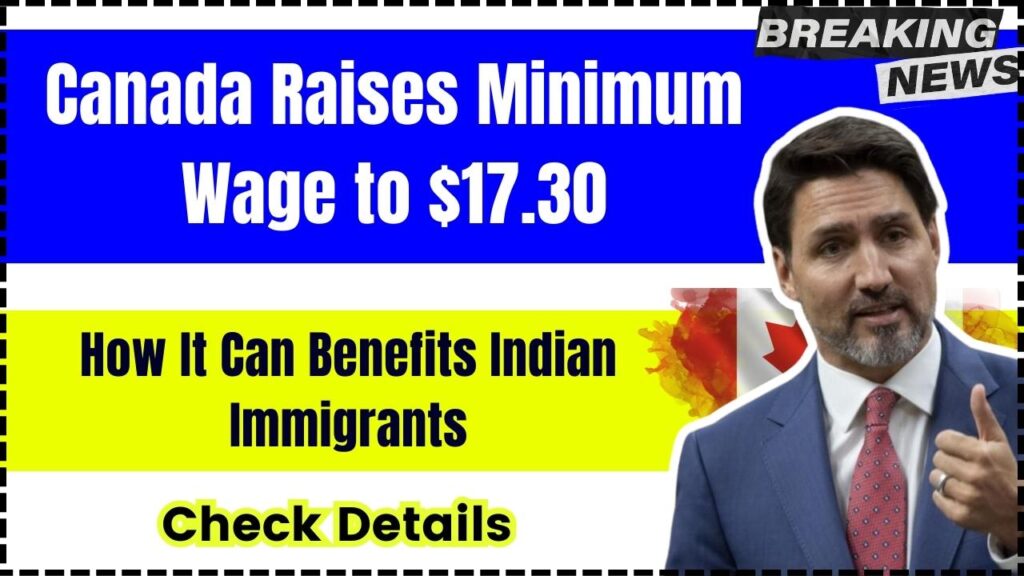Canada Raises Minimum Wage to $17.30: As of April 1, 2025, Canada’s federal minimum wage has been increased to $17.75 per hour, up from $17.30. This change is part of Canada’s annual adjustment policy to reflect the rising cost of living, aiming to provide fair and competitive wages for workers in federally regulated industries.

For many workers—especially Indian immigrants, who make up a large and growing segment of Canada’s labor force—this wage increase is more than just a number. It represents better financial stability, increased earnings, and a stronger foothold in the Canadian economy.
Canada Raises Minimum Wage to $17.3
| Aspect | Details |
|---|---|
| New Federal Minimum Wage | $17.75 per hour (effective April 1, 2025) |
| Sectors Affected | Banking, telecommunications, postal services, interprovincial transportation |
| Provinces with Higher Rates | Yukon: $17.94; Nunavut: $19.00 |
| Benefits to Indian Immigrants | More income, improved quality of life, stronger economic participation |
| Who Must Comply | Employers in federally regulated industries |
| Minimum Wage Adjustment Date | Annually on April 1 |
Understanding Canada’s Minimum Wage System
Canada adjusts its federal minimum wage annually on April 1 based on the Consumer Price Index (CPI). This ensures that wages keep up with inflation and the real cost of living across the country.
While each province and territory sets its own minimum wage, employees in federally regulated sectors are entitled to the higher of the federal or their province’s wage. This protects workers and ensures fairness regardless of where they live.
Who Is Affected by This Increase?
Approximately 30,000 employees in federally regulated industries will directly benefit from the new wage rate. These industries include:
- Banking and Financial Services
- Postal and Courier Services
- Telecommunications Providers
- Air, Rail, Marine, and Road Transportation Across Provinces
If you work in one of these sectors, this increase applies to you—whether you’re full-time, part-time, or temporary.
What Does This Mean for Indian Immigrants?
Indian immigrants make up a significant part of Canada’s labor market. Many work in regulated industries, as well as service sectors where minimum wage plays a pivotal role in household income.
Here’s how the increase helps Indian immigrants:
1. More Money in Your Pocket
A higher minimum wage means more monthly income. For someone working full-time (40 hours/week), that’s an additional $93 per month—enough to help with groceries, rent, or savings.
2. Greater Financial Stability
With increased wages, it becomes easier to plan for the future, support families, and manage unexpected costs.
3. Improved Quality of Life
Higher earnings often lead to better housing, health, education, and overall well-being—especially for newcomers building a life in Canada.
4. Stronger Economic Participation
With more disposable income, immigrants can invest, spend locally, and contribute more taxes, playing a greater role in Canada’s economic growth.
Comparison: Minimum Wages by Region (April 2025)
While the federal minimum wage is $17.75, some provinces and territories pay even higher:
- Yukon: $17.94/hour
- Nunavut: $19.00/hour
- British Columbia: Expected to raise rates mid-2025
- Ontario & Quebec: Vary, but generally below the new federal rate
If you’re employed in a federally regulated job, you will be paid the higher of your local or federal wage. It’s important to check with your employer and HR to ensure compliance.
How to Ensure You’re Getting Paid Fairly
1. Know Your Industry
Confirm whether your employer falls under federal jurisdiction. Jobs in banks, airlines, or telecom companies are federally regulated.
2. Check Your Pay Stub
After April 1, ensure your hourly rate reflects the updated wage. Multiply your hours by the new rate to confirm your gross pay.
3. Understand Provincial Differences
If your province or territory mandates a higher minimum wage than $17.75, your employer is obligated to pay that higher rate.
4. Raise Concerns Promptly
If you’re not receiving the correct pay, speak with your supervisor or HR. If the issue isn’t resolved, contact your local labor board.
2025 Canada Disability Benefit Bill – Check Important Details and Official Payment Dates!
Everything You Need to Know About Personal Loans in Canada
Canada’s 2025 Dental Care Program Is Here – How to Claim Your Free Coverage!
FAQs About Canada Raises Minimum Wage to $17.3
Who does the federal minimum wage apply to?
Only workers in federally regulated industries. Most other jobs follow the provincial minimum wage.
Will this wage increase affect part-time workers?
Yes, all employees, whether full-time, part-time, or temporary, in federally regulated sectors are eligible for the new rate.
What about students or interns?
If they are paid workers in a regulated sector, they are also entitled to at least $17.75/hour. Unpaid internships are not covered.
How is overtime calculated?
Overtime is generally 1.5 times the regular hourly wage. So at $17.75/hour, overtime would be at $26.63/hour.
What if my province has a higher wage?
You’ll be paid the higher of the two rates—federal or provincial—based on your job’s regulation.
Pro Tips for Indian Immigrants
- Join local labor unions or advocacy groups to stay informed about your rights.
- Use online tools and apps to track hours and pay.
- Attend employment workshops offered by immigrant support organizations.
- Explore career development programs to move into higher-paying positions.








